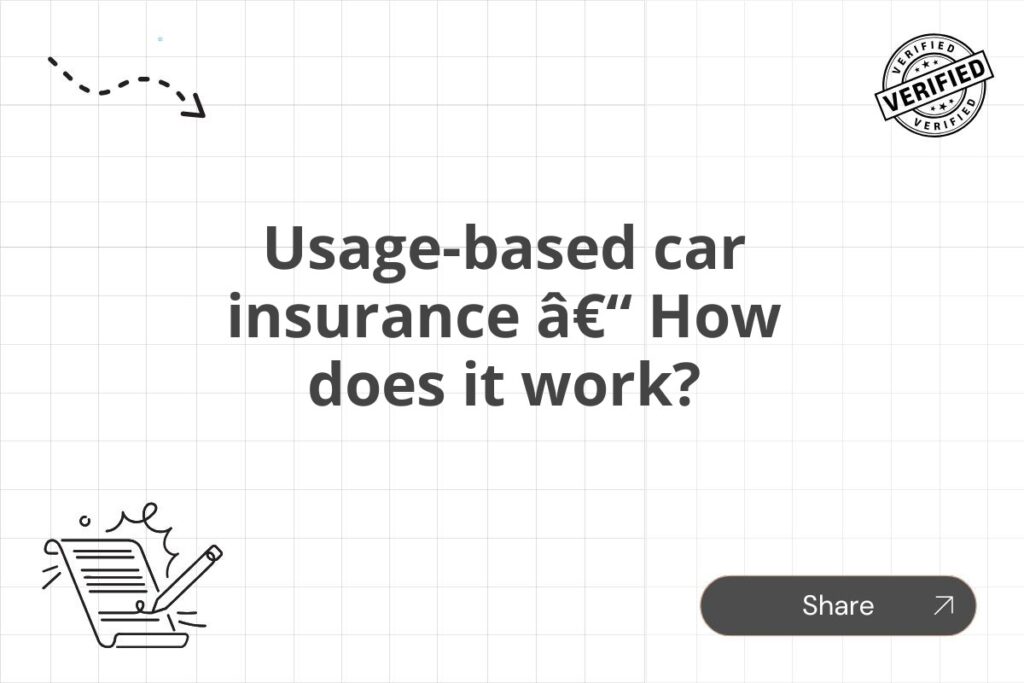Meta Description: Unlock lower car insurance premiums with usage-based insurance! Learn how it works, what factors influence your rates, and if it’s the right choice for you. Discover the benefits and drawbacks of this innovative approach to auto insurance.
Usage-based car insurance (UBI), also known as pay-as-you-drive (PAYD) insurance, is revolutionizing the auto insurance industry. Unlike traditional insurance models that rely primarily on factors like age, driving history, and vehicle type, UBI utilizes telematics to track driving behavior and adjust premiums accordingly. This means that safer, more responsible drivers can potentially enjoy significantly lower insurance costs.
But how does it actually work? This comprehensive guide will delve into the mechanics of UBI, exploring its benefits, drawbacks, and suitability for different types of drivers. We’ll uncover the technology behind it, analyze the factors influencing your rates, and address common concerns and misconceptions.
How Usage-Based Car Insurance Works
At the heart of UBI lies telematics. This technology involves using a small device, often plugged into your car’s onboard diagnostics (OBD) port, or a smartphone app, to monitor your driving habits. These devices collect data on various aspects of your driving, including:
- Mileage Driven: This is often the most significant factor. The less you drive, the lower your premium.
- Time of Day Driving: Driving during peak hours (typically rush hour) might be considered riskier and could lead to higher rates.
- Speed: Excessive speeding significantly increases your risk score and premium.
- Acceleration and Braking: Hard acceleration and braking indicate aggressive driving, raising your risk profile.
- Location: Some insurers analyze the location of your drives, potentially identifying higher-risk areas.
- Cornering: Sharp turns and aggressive cornering can also influence your score.
The data collected is transmitted wirelessly to your insurer. Sophisticated algorithms then analyze this information to generate a personalized risk score. This score, combined with other traditional factors, determines your premium. The more safely and responsibly you drive, the lower your risk score and the lower your insurance costs.
Types of Usage-Based Insurance Programs
There’s a variety of UBI programs available, each with a slightly different approach to data collection and premium calculation:
1. Mileage-Based Insurance:
This is the simplest form of UBI, focusing solely on the number of miles driven. It’s ideal for low-mileage drivers who want to save money on insurance without the detailed monitoring of other UBI programs.
2. Behavior-Based Insurance:
This type of UBI goes beyond mileage, considering a wider range of driving behaviors, including speed, acceleration, braking, and cornering. It provides more accurate risk assessment and potentially greater savings for responsible drivers.
3. Hybrid Programs:
Many insurers offer hybrid programs that combine elements of both mileage-based and behavior-based insurance. This allows for a more comprehensive evaluation of driving habits while still rewarding low-mileage drivers.
Benefits of Usage-Based Car Insurance
UBI offers several compelling advantages:
- Lower Premiums: For safe and responsible drivers, UBI can lead to significantly lower premiums compared to traditional insurance.
- Personalized Pricing: The premiums are tailored to individual driving behavior, making it fairer for those who drive safely.
- Improved Driving Habits: The constant monitoring encourages safer driving practices, potentially leading to fewer accidents.
- Feedback and Insights: Some programs provide feedback on your driving habits, allowing you to identify areas for improvement.
- Discounts and Rewards: Many insurers offer discounts and rewards for safe driving.
Drawbacks of Usage-Based Car Insurance
Despite its benefits, UBI also has some potential drawbacks:
- Privacy Concerns: Some drivers are concerned about the collection and use of their driving data. It’s crucial to review the insurer’s privacy policy carefully.
- Device Installation and Maintenance: You’ll need to install and maintain the telematics device, which might be inconvenient for some.
- Data Accuracy: The accuracy of the data collected can be affected by factors like GPS signal strength and device malfunctions.
- Potential for Higher Premiums: If you’re an aggressive driver, your premiums might be higher than with traditional insurance.
- Limited Availability: UBI is not yet widely available in all regions or with all insurance companies.
Is Usage-Based Car Insurance Right for You?
Whether UBI is suitable depends on your individual driving habits and preferences. If you’re a safe, low-mileage driver, it’s likely to offer significant savings. However, if you frequently drive aggressively or have concerns about data privacy, traditional insurance might be a better option. Carefully weigh the benefits and drawbacks before making a decision. Compare quotes from different insurers offering UBI programs to find the best fit for your needs and budget.
Choosing a Usage-Based Car Insurance Provider
When selecting a UBI provider, consider the following:
- Data Privacy Policy: Carefully review the insurer’s privacy policy to understand how your data will be collected, used, and protected.
- Pricing Structure: Compare the pricing structures of different providers to see how your driving habits will impact your premiums.
- Device and App Features: Examine the features of the telematics device or app, ensuring it’s user-friendly and compatible with your vehicle.
- Customer Service: Check the insurer’s reputation for customer service and responsiveness.
- Discounts and Rewards: Consider the discounts and rewards offered for safe driving.
In conclusion, usage-based car insurance presents a promising alternative to traditional auto insurance. By rewarding safe driving habits, it offers the potential for significant savings while promoting safer roads. However, it’s essential to carefully consider the potential drawbacks and choose a reputable provider that aligns with your needs and values. Understanding how it works is the first step toward making an informed decision about whether UBI is the right choice for you.






















